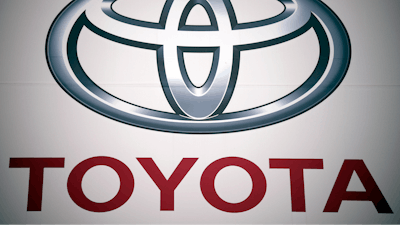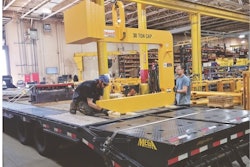
TOKYO (AP) — Toyota doubled its net profit in the fiscal year that ended in March, as strong vehicles sales and a favorable exchange rate lifted results for Japan's top automaker.
Toyota Motor Corp.'s annual profit totaled 4.9 trillion yen ($31.9 billion), up from 2.45 trillion yen the year before, while its sales jumped 21% to 45 trillion yen ($290 billion), the company said Wednesday.
The results exceeded Toyota's own projection for a 4.5 trillion yen ($29 billion) profit, as its global sales surged to 9.4 million vehicles from 8.8 million vehicles in the previous fiscal year.
Sales of hybrids performed well, although Toyota stressed it was working hard to offer various kinds of electric vehicles, including battery EVs, plug-ins and fuel cell models.
A weak yen worked as a big plus for Toyota, which makes the Camry sedan, Prius hybrid and Lexus luxury models. The U.S. dollar cost an average of 145 Japanese yen during the last fiscal year, up from 135 yen in the year before, according to Toyota.
For the January-March quarter, Toyota earned 997.6 billion yen ($6.4 billion), up from 552 billion yen in the previous year, on 11 trillion yen ($71 billion) in sales, up from 9.7 trillion yen.
The company, based in central Japan's Toyota city, now expects to sell 9.5 million vehicles during this fiscal, with sales projected to grow in the U.S. and the rest of Asia.
Toyota said it will make key investments in areas such as research on technology in coming months to sustain long-term growth.
It expects its net profit for the fiscal year through March 2025 to decline nearly 28% to 3.57 trillion yen ($23 billion), with spending also covering investments in workers at suppliers and dealers it called "human capital."
"The latest results show that our efforts have borne fruit, but we need keep growing with the vision to become a mobility company," Chief Executive Koji Sato told reporters.
Toyota needs to take up challenges in a way Sato described as more dramatic than Toyota's trademark "kaizen," which refers to day-by-day improvements that originate from the factory floor.
Developing ecological vehicles while sticking to Toyota's pristine reputation for safety and quality requires the company to "solidify the ground it's standing on."
The auto industry is undergoing a sweeping transformation away from old-style gasoline engines, especially in markets like China, where EVs dominate and some analysts say automakers like Toyota may have fallen behind.
Like other manufacturers, Toyota was hit hard by a shortage in computer chips and other components during the pandemic. The latest results show it has rebounded from the production crunch.






















